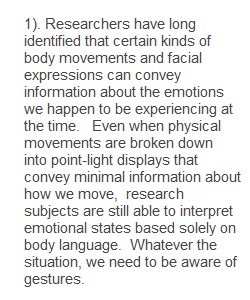


Q Class Discussion - Emotion, Stress, and Health 1414 unread replies.3333 replies. Things are getting stressful now. Before you let it get to you, let's take a look at how it could be affecting your health. Watch the following video: Emotion, Stress, and Health: Crash Course Psychology #26 (Links to an external site.) 1. Comment on how Emotions work. You can choose a topic from the following: • Emotion expert Paul Ekman says that facial emotions are culturally universal, although Lisa Barrett Feldman and others have challenged this idea. • Facial Feedback Hypothesis - Facial expressions not only communicate our emotions, they also regulate our emotions. • Introverts vs. Extroverts • Gestures - Far from universal. • Carol Izzard's ten basic emotions. • Emotional Two Dimensional Model - valence (positive or negative) and arousal (high or low) 2. Comment on how anger, happiness and depression can affect your health. Try to limit your discussion to one of the following: • Stress - a reaction to our emotion, based on our appraisal of the stimulus causing the emotion. • Types of stressors - catastrophes, significant life changes, everyday inconveniences, or a combination of these. • Short-term stress is a GOOD thing. • The function of Adrenaline and Cortisol. • Chronic stress is a BAD thing - Digestive, Respiratory, Circulatory, and Infectious Disease • Autonomic Nervous System - Sympathetic vs. Parasympathetic • Enteric Nervous System Answer the two questions above in a 75-100 word reply for each. Respond to at least two other students in 75-100 words, preferably someone who chose a different topic. Note: Click the options button in the upper right corner to see the rubric for this exercise.
View Related Questions